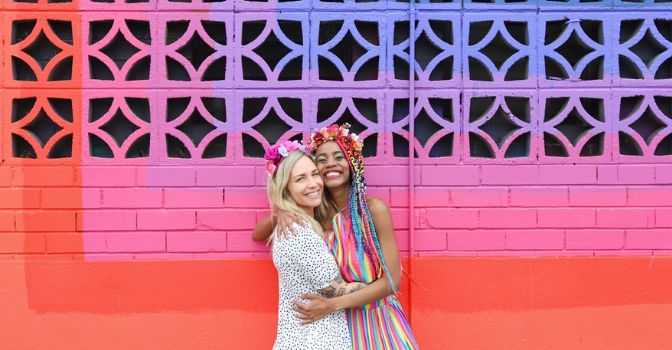Everything about Rainbow Muse is vibrant, welcoming and colourful. The Naarm (Melbourne)-based clinic takes a different approach to mental health and therapy services – with creativity, magic and a lot of rainbows.
Rainbow Muse offers therapy and psychology services for clients with and without disabilities in an environment that celebrates diversity.
Founder Chenai Mupotsa-Russell set out to create an inclusive, safe therapeutic space where people who do not like or fit into “boxes” could feel seen and get tailored treatment to suit their needs.
Chenai, who has a background in community development, mental health, art therapy and yoga, established Rainbow Muse in 2019. She teamed up with best friend Sammy Elliott, who had been running Girl and Dog Psychology and the two practices merged to open Rainbow Muse Clinic in 2022.
Rainbow Muse now boasts a team of eleven allied health professionals who support people of all ages through art therapy, psychology, clinical psychology, play therapy, family therapy, animal assisted therapy, support work, yoga, mindfulness and more!
Rainbows are a symbol of inclusion.
Chenai is passionate about rainbows and wears them from head to toe every day. Rainbows are known as a symbol of inclusion and hope, representative of the neurodiverse and the LGBTQIA+ communities.
When Chenai completed her Master’s in Art Therapy, the thesis title was “Look at all the rainbows”. During that process, she discovered therapeutic spaces featuring rainbows felt safer for her clients.
“Sometimes people express themselves only in the way that the environment allows them to, or how they think society expects them to behave. I learned that the rainbows created a sense of freedom, that marginalised young people would see the rainbows and feel assured they could be fully themselves and not judged,” she said.
“We believe everyone has the capacity for magic – some people just need a little help uncovering their sparkle. Rainbow Muse celebrates all people, ethnicities, faiths, sexual orientations and gender identities. We want people to come to our website or clinic, see the rainbows and immediately know they belong.”
Creating a safe space for young people on the NDIS.
The Rainbow Muse team works with many NDIS clients. Every program is unique for each individual and may include a combination of therapies, working with different team members, Rainbow Muse support workers and other allied health professionals.
“A person’s NDIS journey can be complex and often several people need to be part of the plan at different points and sometimes simultaneously,” says Chenai. “Often young people have a lot to unpack, particularly if there is trauma, cultural factors or they’re exploring gender or sexuality alongside striving to achieve their NDIS goals.”
Chenai provides an example of a young client who had social and community participation goals in their NDIS Plan and wanted to attend an under 18’s event run by an LGBTQIA+ organisation. A Rainbow Muse support worker went with them the first time, which gave them the confidence to attend subsequent events with a friend.
“When you create a safe space allowing people to define who they are on their own terms, what unfolds is really beautiful, allowing people to heal, grow and shine,” Chenai explains.
Therapy as a tool for expression.
Art therapy has been shown to benefit people of all ages. Because art therapy allows people to express feelings on any subject through creative work rather than with speech, it is beneficial for anyone who feels out of touch with their emotions or feelings.
“Art therapists are trained to pick up on nonverbal symbols and metaphors that are often expressed through art and the creative process – concepts that are usually difficult to express with words,” Chenai says.
“It is through this process that the individual really begins to see the effects of art therapy and the discoveries that can be made. It can help to develop coping skills and strategies, enhance self-esteem and improve motor skills and physical coordination, along with many other benefits.”
“Art therapy is also a good option for culturally and linguistically diverse clients as well as First Nations People as it provides an alternative to talk therapy and frameworks that may not be culturally appropriate or accessible within the context of one’s own understanding of health and wellbeing.”
Rainbow Muse is intentionally flexible about therapy with less sitting and talking and more dynamic, creative activities. A trained yoga teacher, Chenai often incorporates yoga into sessions, finding it helpful for establishing body-mind connection.
“Yoga is a powerful tool for self-regulation and cognitive processing. It can be really calming and grounding at the start of a session and easily adapted for people of any ability,” she said.
Rainbow Muse is currently fully booked but may be able to create space for individuals with a disability who are not able to access support from other mainstream services due to the intersections of their diverse identities. If that’s you, please complete the form on their website.
Further reading.
Assistance with Social and Community Participation.
Outside the box: Diverse therapy options for kids.
The ‘Happy Team’ helping animal lovers thrive.

